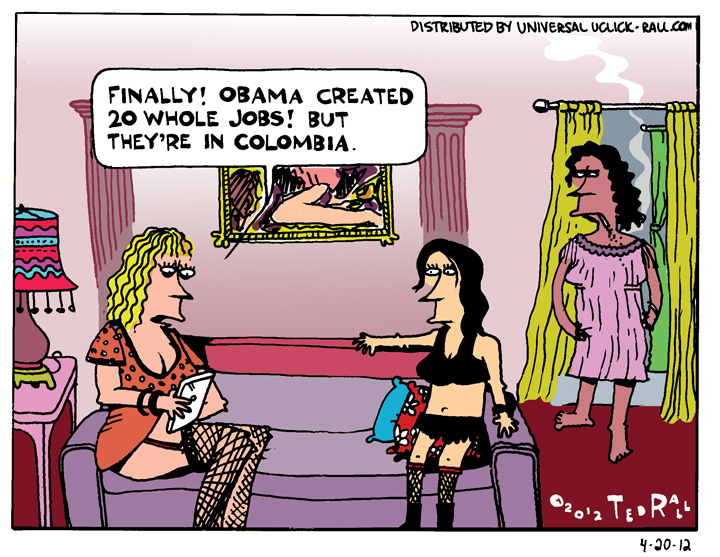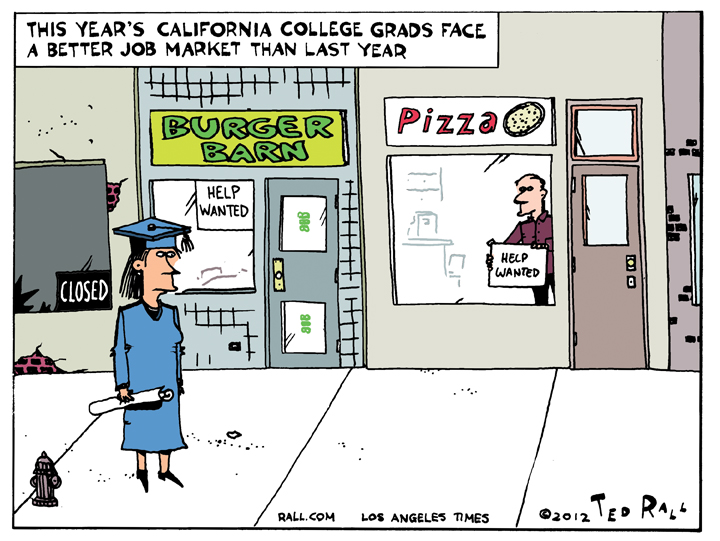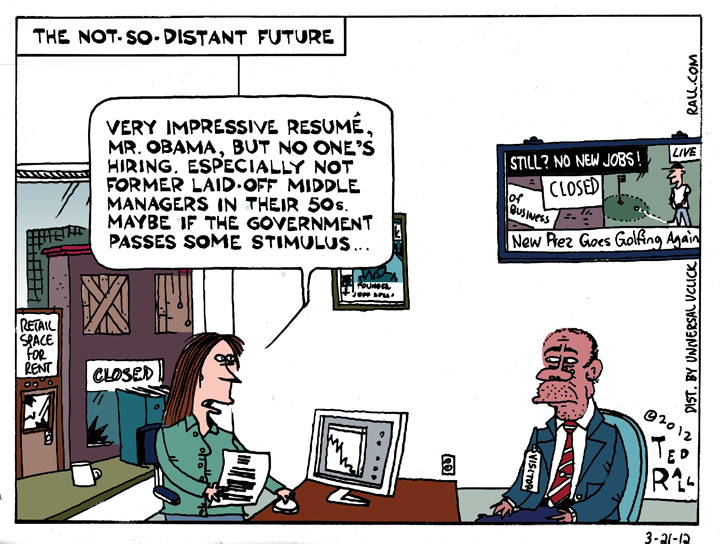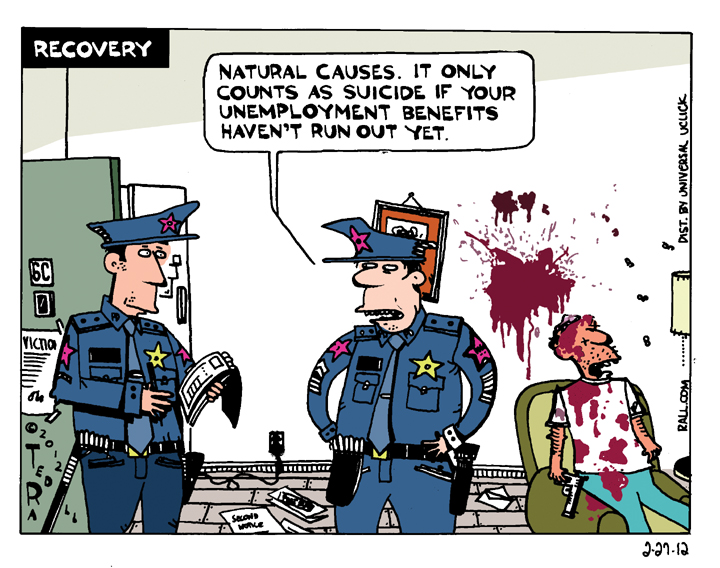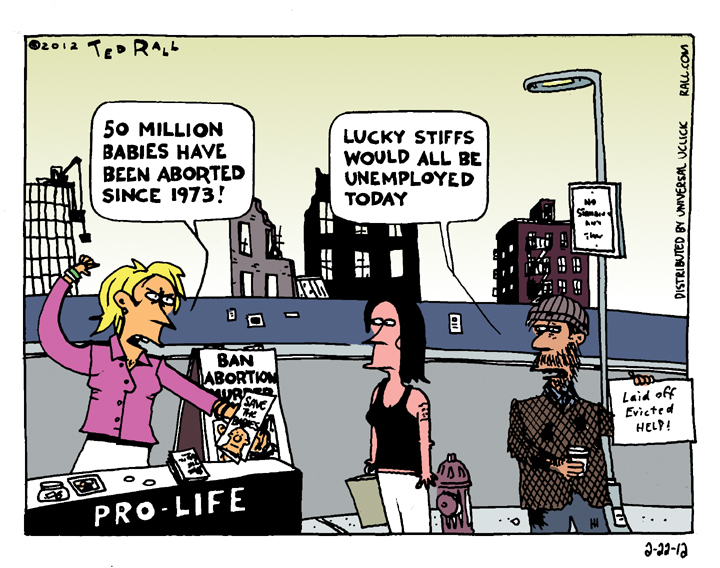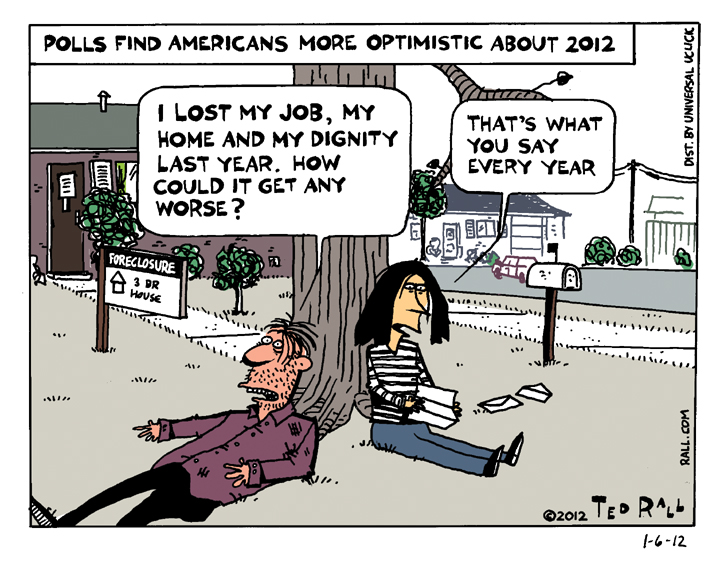Obama’s Secret Service detail is accused of hiring 20 prostitutes during a state visit to Colombia. Too bad those jobs couldn’t be here in America.
Los Angeles Times Cartoon: Disappointing News From El Norte
I draw cartoons for The Los Angeles Times about issues related to California and the Southland (metro Los Angeles). This week: U.S. Border Patrol agents are asking Mexican and Central American TV stations to discourage illegal immigration. But simply reporting the news about the terrible US economy ought to do the trick.
SYNDICATED COLUMN: Handicapped
Conventional Wisdom Is Wrong. It’s Romney’s To Lose.
Catching Barack Obama in a rare moment of candor, an open mic found the president confiding to his Russian counterpart that he expects to win this fall. “This is my last election,” he told Russian President Dmitry Medvedev.
Last, yes. But I wouldn’t bet on Obama winning.
The corporate pundit class has largely conceded the general election to Obama, already looking ahead to 2016. The mainstreamers have their reasons. Their analysis is based on good, solid, reasonable (inside the box) logic. All things considered, however, I would (and have) put my money on Mitt Romney this fall.
This isn’t wishful thinking. I voted for Obama last time and wanted him to succeed. He failed. His accomplishments have been few and have amounted to sellouts to the right. Even so, the prospect of watching Mitt Romney move into the White House fills me with as much joy as an appointment for a colonoscopy. And I think he’s going to win.
For me, the D vs. R horserace is a parlor game with minor ramifications for our daily lives. Whichever corporate party wins, unemployment and underemployment will continue to worsen, income disparity will widen, and most of our taxes will fund the worst approach to international affairs since a former Austrian corporal blew out his brains out in a bunker under Berlin.
Thanks to the Occupy movement, real politics is back where it belongs—in the streets. That’s what I’ll be watching and working. With a lot of luck (and even more pepper spray) this will be a year of revolution rather than more electoral devolution.
Revolution is inevitable. But we don’t know when it’s coming. So the 2012 campaign may still matter. Besides, handicapping elections is a game I enjoy and am good at. During 17 years of syndication my pick to win has only lost once (for the 2004 Democratic nomination). So, on the off chance that you’re one of those who still cares about our husk of a democracy, who hangs on every meaningless development of a political process devoid of politics—or you’re just a betting person, here’s my thinking.
Barring an assassination or a scandal, Mitt Romney will be the Republican nominee.
Obama currently leads Romney by about four to five points. But that’s not nearly enough of a lead to carry him to November. History shows that Republican nominees steadily increase in popularity throughout the summer and fall of an election year.
In April 2004, for example, John Kerry led George W. Bush by eight points. But Swift Boating erased that lead, and then some.
In order to win, a successful Democratic nominee has to begin with a big margin. That early lead must be large enough to wind up in the black, after months of being whittled away, when the votes get counted in November. I can’t see Obama pulling far enough ahead soon.
Incumbency is a huge advantage. If the election were held tomorrow, Obama would prevail. But the election is not being held tomorrow. It’s being held in November.
By the time they head to the polls this fall, voters’ brains will be drowning in months of hundreds of millions of dollars of slick, demographically targeted, pro-Romney attack ads. Republican campaigns are more effective at this sort of thing, and as Newt Gingrich and Rick Santorum can attest, Romney’s consultants pull no punches. Obama’s current lead will be a faded memory.
Every political campaign comes down to a contest of narratives. In 2008 Obama developed an effective sales pitch: Hope and Change for a nation exhausted by eight years of Bush, 9/11, war, taking off your shoes at the airport, and a full-fledged global economic crisis to boot. Obama’s advisers turned his biggest weaknesses—his inexperience, race, unusual name and foreign background—into assets. Here was a new kind of president. Just the guy to lead us out of the Bad Old Days into something better. McCain-Palin’s narrative—a cranky old ex-POW paired with a zany housewife-gone-wild—didn’t stand a chance.
This year the narratives favor Romney.
Romney is already pointing to the biggest issue on people’s minds, the economy, and claiming that his background as a turnaround artist qualifies him to fix what ails us. His prescriptions are Republican boilerplate, vague and counterproductive, but at least he’s doing something Obama hasn’t—talking a lot about creating jobs. Voters prefer useless attentiveness to calm, steady golfing (Obama’s approach). And—despite its illogic—they like the run-government-like-a-business narrative (c.f. Ross Perot, the Bushes).
Obama is boxed in by three-plus years of inaction on, well, pretty much everything. He’ll argue that he’ll be able to “finish the job” during a second term, but that’s a tough sell when you haven’t tried to start the job—in 2009, when Democrats had huge majorities in both houses of Congress. His single signature accomplishment, healthcare reform, is disliked by two-thirds of the electorate. The recent “good news” on the economy has been either insignificant (net positive job creation of 100,000 per month for two months, less than one-tenth of one percent of the 25 million jobs needed) or falsified (discouraged workers no longer counted as unemployed).
Despite what Obama tells them, Americans know things are still getting worse. Similarly, Obama’s recent, feeble, impotent rhetorical attempts to shore up his support among his Democratic Party’s disappointed liberal base will probably not generate enough enthusiasm to counter other factors that favor Romney.
You can’t vote for the first African-American president twice. Unless he picks a woman as vice president, a vote for Obama will be a vote for the same-old, same-old. The history-making thrill is gone.
At this writing the Republican Party appears to be in disarray. No doubt, Romney is emerging from the primaries battered and bruised. His awkward and demented soundbite stylings (“corporations are people,” “the trees are the right height”) will provide fodder for countless YouTube parodies. But Romney hasn’t been damaged as much as the official political class seems to think.
Republicans are a remarkably loyal bunch. United by their many hatreds (liberals, blacks, gays, poor people, Mexicans, Muslims, foreigners, etc.), they will set aside their comparatively low simmer of anti-Mormon bigotry this fall. Picking a standard-issue white Anglo Christianist thug as veep will cinch the deal.
The GOP enjoys a huge fundraising advantage, especially via the new-fangled SuperPACs. Romney has raised $74 million against $151 million for Obama, but look for that ratio to flip after he locks up the nomination. Cue those vicious, potent ads mentioned above.
About the only major factor working for Obama is the presidential debates. Romney doesn’t stand a chance against the cool, articulate Obama.
Of course, it’s a long way to November. A lot can happen. It’s very possible for Obama to win. But that’s not how it looks now.
(Ted Rall’s next book is “The Book of Obama: How We Went From Hope and Change to the Age of Revolt,” out May 22. His website is tedrall.com.)
Los Angeles Times Cartoon: More Bad Jobs
I draw cartoons for The Los Angeles Times. This week comments on the “good news” that recent college grads are getting more job offers than last year.
SYNDICATED COLUMN: You’re Not Underemployed. You’re Underpaid.
The Case for Shiftlessness
No bank balance. Nothing in your wallet.
“I’m broke,” you say. “I need a job.”
Or:
Perhaps you have a job. Then you say:
“I’m broke. I need a better job.”
You’re lying. And you don’t even know it.
You don’t need a job.(Unless you like sitting at a desk. Working on an assembly line. Non-dairy creamer in the break room. In which case I apologize. Freak!)
You don’t need a job. You need money.
We’ve been programmed to believe that the only way to get money is to earn it.
(Unless you’re rich. Then you know about inheritance. In 1997, the last year for which there was solid research done on the subject, 42 percent of the Forbes 400 richest Americans made the list through probate. Disparity of wealth has since increased.)
It’s time to separate income from work.
For two reasons:
It’s moral. No one should starve or sleep outside or suffer sickness or go undereducated simply due to bad luck—being born into a poor family, growing up in an area with high unemployment, failing to impress an interviewer.
It’s sane.
“American workers stay longer at the office, at the factory or on the farm than their counterparts in Europe and most other rich nations, and they produce more over the year,” according to a 2009 U.N. report cited by CBS. Thanks to technological innovations and education, worker productivity—GDP divided by total employment—has increased by leaps and bounds over the years.
U.S. worker productivity has increased 400 percent since 1950. “The conclusion is inescapable: if productivity means anything at all, a worker should be able to earn the same standard of living as a 1950 worker in only 11 hours a week,” according to a MIT study.
Obviously that’s not the case. American workers are toiling longer hours than ever. They’re not being paid more —to the contrary, wages have been stagnant or declining since 1970. Numerous analyses have established that, especially since 1970, the lion’s share of profits from productivity increases have gone to employers.
Workers are working longer hours. But fewer people are working. Only 54 percent of work-eligible adults have jobs—the lowest rate in memory. Which isn’t surprising. Because there are fixed costs associated with employing each individual—administration, workspace, benefits, and so on—it makes sense for a boss to hire as few workers as possible, and to work them long hours.
This witches’ brew—increased productivity coupled with higher fixed costs, particularly healthcare—have led companies to create a society divided into two classes: the jobless and the overworked.
Unemployment is rising. Meanwhile, people “lucky” enough to still have jobs are creating more per hour than ever before and are forced to work longer and harder.
Crazy.
And dangerous. Does anyone seriously believe that an America divided between the haves, have-nots and the stressed-outs will be a better, safer, more politically stable place to live?
Sci-fi writers used to imagine a future in which machines did everything, where people enjoyed their newfound leisure time exploring the world and themselves. We’re not there yet—someone still has to make stuff—but we should be closer to the imagined idyll of zero work than we are now.
If productivity increases year after year after year, employers need fewer and fewer employees to sustain or expand the same level of economic activity. But this sets up a conundrum. If only employees have money, only employees can consume goods and services. As unemployment rises, the pool of consumers shrinks.
The remaining consumers can’t pick up the slack because their wages aren’t going up. So we wind up with a society that produces more stuff than can be sold: Marx’s classic crisis of overproduction. Hello, post-2008 meltdown of global capitalism.
Silicon Valley entrepreneur Martin Ford warns that the Great Recession is just the beginning. In his 2009 book “The Lights in the Tunnel: Automation, Accelerating Technology and the Economy of the Future” Ford, “argues that technologies such as software automation algorithms, artificial intelligence (AI), and robotics will result in dramatically increasing unemployment, stagnant or falling consumer demand, and a financial crisis surpassing the Great Depression,” according to a review in The Futurist.
The solution is clear: to guarantee everyone, whether or not he or she holds a job, a minimum salary sufficient to cover housing, transportation, education, medical care and, yes, discretionary income. Unfortunately, we’re stuck in an 18th century mindset. We’re nowhere close to detaching money from work. The Right wants to get rid of the minimum wage. On the Left, advocates for a Universal Living Wage nevertheless stipulate that a decent income should go to those who work a 40-hour week.
Ford proposes a Basic Income Guarantee based on performance of non-work activities; volunteering at a soup kitchen would be considered compensable work. But even this “radical” proposal doesn’t go far enough.
Whatever comes next, revolutionary overthrow or reform of the existing system, Americans are going to have to accept a reality that will be hard for a nation of strivers to take: we’re going to have to start paying people to sit at home.
(Ted Rall’s next book is “The Book of Obama: How We Went From Hope and Change to the Age of Revolt,” out May 22. His website is tedrall.com.)
COPYRIGHT 2012 TED RALL
SYNDICATED COLUMN: Death and Trivia
Bankrupt and Corrupt, U.S. Can’t/Won’t Address Issues We Care About
Millions of Americans won’t vote this November. “Voter participation in the U.S. remains consistently below corresponding levels in most other western democracies,” the International Business Times reported last year. “In countries like Italy, Belgium, Austria and Australia, more than 90 percent of the voting public cast ballots at election time.”
They—the corporate politicians and their media mouthpieces—call it apathy. Obama advisor David Axelrod blamed it for the Iraq War. “There was apathy in 2000, and Al Gore lost that election to George W. Bush by 300 votes, and as a result we wound up in Iraq,” he told the Harvard Crimson. That’s crap. People don’t boycott elections because they don’t care. They are alienated.
We don’t care about two-party electoral politics because two-party electoral politics don’t care about us.
What are Americans most worried about this election season? The same thing we’ve been most worried about for years: the economy. You name the poll: local or national, liberals or conservatives doesn’t matter. Tens of millions of people are unemployed. People who still have jobs live in terror of layoffs. Real inflation is out of control but salaries are frozen or falling. (The fact that we have to specify “real” says a lot about the gap between life out here “on the ground” and over there “inside the Beltway.”)
We’re being ground down. Demoralized. Bankrupted. And they don’t care. Not only do they not care, they don’t notice.
The Fed and the White House are colluding in their quadrennial tradition of ginning up a pseudo-boomlet to support the incumbent. Thus the latest Dow bubble and phony 8.3 percent unemployment rate, which count people who have given up looking for work as “employed.”
Everyone knows the recovery is fiction. Who are you going to believe—the talking heads or your lying, overdrawn, second-mortage line of credit? According to the latest Gallup tracking poll, which actually asks actual people how they’re actually doing in the actual world, 9.1 percent of Americans are unemployed and 19.0 percent are underemployed. When 28.1 percent of Americans are broke, that affects everyone, including the richest 1% trying to sell goods and services.
People expect their “representative” democracy to represent their interests. To address their problems. And solve them.
No wonder why we’re so apathetic. Our “leaders” hardly talk about the economy.
Santorum is more worried about how easy it is to get sex than how hard it is to find work.
Romney thinks it’s 1992 and that he’s Ross Perot, the businessman who promised to run America like a corporation. As though it wasn’t already. As if that wasn’t the problem.
Obama imagines that we didn’t notice that he only started asking Congress to work on the economy after Congress fell under the control of the other party. We’re slow. We’re not deranged.
Our dying political system is unwilling and unable to address joblessness and the widening class divide because our misery isn’t an aberration. It’s an inherent manifestation of corporate capitalism. Ordinary Americans understand this. Half the citizens of this “conservative” country already prefer socialism or communism, according to a Gallup poll conducted in December—watch that go up—yet the political class dares not question the Crappy Economic System That Must Not Be Named.
Since they can’t take on the real issues the elites are reduced to the politics of distraction.
Kids and death.
Those are the D-grade “issues” the powers that be are using this week in order to avoid talking about the atrocious economy.
Federal regulators announced on February 27th that all cars manufactured after 2014 must feature rearview cameras that allow drivers to see what is behind them. The National Highway Traffic Administration says that “95 to 112 deaths and as many as 8,374 injuries could be eliminated each year by eliminating the wide blind spot behind a vehicle,” reported The New York Times. The estimated cost of the devices is $2.7 billion per year.
“In terms of absolute numbers of lives saved, it certainly isn’t the highest,” admitted Clarence Ditlow of the Center for Auto Safety. “But in terms of emotional tragedy, backover deaths are some of the worst imaginable. When you have a parent that kills a child in an accident that’s utterly avoidable, they don’t ever forget it.”
No doubt. I can imagine. By all means, put in those cameras.
But there’s something screwy about a political culture that slaps this trivial story on the front page of the biggest newspaper in the country and makes it a Congressional priority while the elephants in the room go unaddressed. Every year 17,000 Americans die in slip and fall accidents—151 times the rate from backover car accidents. Maybe we should install cameras on the backs of our heads.
Yo, moron journalists and politicos: Jobs! We care about jobs!
If you idiots must obsess over cars, why aren’t you pushing through radical improvements in fuel efficiency, like requiring that every car made after 2014 be either electric or a hybrid? Autos are a major cause of air pollution, which triggers asthma attacks, which kill at least 5000 people annually in the U.S.
It’s not just about the kiddie-poos. The establishments is still wallowing in Bush’s hoary post-9/11 death cult.
The day after its hold-the-presses car-cameras scoop the Times was back with another page-one heartstopper:
“The mortuary at Dover Air Force Base in Delaware disposed of body parts of some victims of the Sept. 11, 2001 attacks by burning them and dumping the ashes in a landfill,” began the story. The victims were killed on Flight 93, which crashed in western Pennsylvania.
Gross? No doubt. Inappropriate? Unquestionably. Important? Hell no.
The worst thing that could ever happened to the people to whom those body parts belonged occurred before. They were dead. Murdered. What went down after that was comparatively trivial.
Not to stir up the Truthers (with whom I disagree), but a more appropriate front-page story would ask: “More Than 11 Years After 9/11, Why Hasn’t There Been an Independent Investigation?”
Here’s what we’ve come to: Get killed on Flight 93 and no one bothers to find out what really happened to you. Have your remains disposed of in a culturally insensitive manner and it’s a scandal.
What if Flight 93 had landed safely? Some passengers would gotten laid off. Some would have been foreclosed upon. And the government wouldn’t have given a rat’s ass about them.
Why don’t people vote?
A better question is: Why do people vote?
(Ted Rall is the author of “The Anti-American Manifesto.” His website is tedrall.com.)
COPYRIGHT 2012 TED RALL

